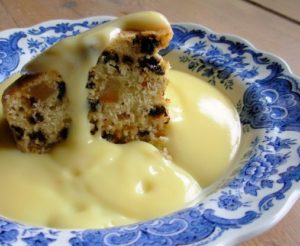We are compelled, for a moment, to discuss the food of the British Isles.
We ask: why should such a sophisticated and culturally diverse nation – one just a few miles away from France – be so gastronomically bereft by comparison? How many of us would honestly prefer an English kidney pudding to a French cassoulet, a cock-a-leekie stew to a fine bouillabaisse, boiled beef to a medium rare Chateaubriand? The names alone of much British fare are enough to spoil an appetite: there’s likky pie: there’s syllabub; and then there’s everybody’s favorite dessert, spotted dick.

Be still our colons.
Why bring this up? Because like English food, it is oh-too-easy to make fun of English music. Afterall, England produced not a single important composer between Henry Purcell – who died in 1695 – and Edward Elgar, who was born in 1857.
What’s that all about?
Let us observe upfront that it had nothing to do with England’s air, water, or food. In fact, England was not always bereft of great composers. The late 1500s and early 1600s – the latter part of the reign of Queen Elizabeth I – saw a brilliant group of composers working in and around London, including William Byrd, Orlando Gibbons, Thomas Morley, John Dowland, John Wilbye, and Thomas Weelkes.

The English Baroque reached its peak with music of Henry Purcell (1659-1695), a first-class genius whose opera Dido and Aeneas of 1689 remains one of the masterworks of the repertoire. Purcell died at the terribly young age of 36 and, as far as major English composers are concerned, that was it until the birth of Edward Elgar in Broadheath, southwest of Manchester, on June 2, 1857. This in not to say there wasn’t a huge appetite for new music in England, but that appetite was fed by German composers.
That appetite had as much to do with political events as it did musical aesthetics.…
Continue reading, only on Patreon!
Become a Patron!